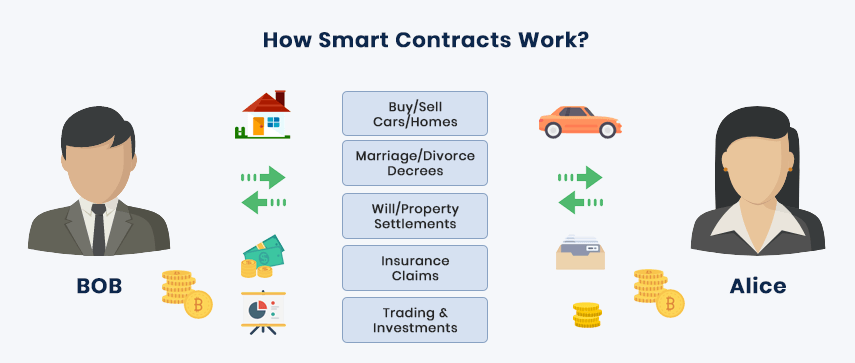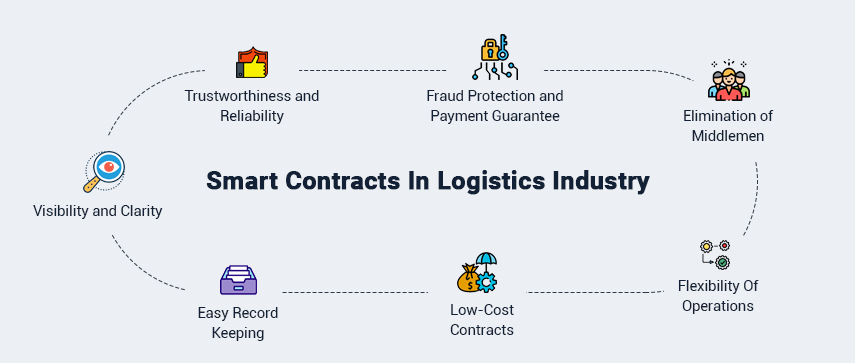The modern business world is a highly complex and dynamic subject. It is always prone to, rather in need of, technologies that make its functions a lot more efficient. One such technology that has taken the business world by storm, its financial processes, in particular, is blockchain technology. It is widely regarded as the reason behind the ongoing and possibly inevitable transformation of online business transactions.

And while you may automatically think of Bitcoins or other cryptocurrencies as the reference for the previous two statements, there is actually another blockchain-affiliated technology that is equally at play here. Known as a smart contract (or crypto-contract), this blockchain-based computer protocol is thought of as the solution to some of the most persistent problems in every industry. In particular, the logistics industry and the supply chain are touted as major beneficiaries of this phenomenon.
What Is Blockchain?

A blockchain is a digital ledger which records transactions or events between parties through the use of cryptography. The key feature of blockchain is that it is not a centralized system. It is an open, peer to peer network which records and stores information in multiple, decentralized locations. Data is not stored as a single unit or a single file but in bits and pieces across multiple nodes (computers). No single person or entity has complete ownership of or control over the blockchain. Each data block (piece of information) is distinctive and time stamped. As a result, every data block is immutable and safe from any tampering. And since all these data blocks are chained together to form the blockchain, the blockchain itself becomes an unalterable and authentic source of information.
What Are Smart Contracts?
A smart contract is a computer code which consists of a preprogrammed set of instructions and which stores the terms of the agreement of a contract between 2 (or more) parties and execute those terms automatically when certain pre-specified conditions have been met. To put it simply, it is a ‘self-executing contract’. It can digitally verify as well as execute a contract without requiring any third party assistance or intermediation. It also sets the rules and penalties pertaining to the agreement; just like a regular, a traditional contract does. The key feature of a smart contract is that it runs on, and is stored in, a blockchain. Hence all the data pertaining to the smart contract and the underlying agreement is stored in a distributed form in a decentralized database (i.e. the blockchain). A smart contract thus inherits a lot of core features and benefits of a blockchain.
Consider this analogy to understand how a blockchain smart contract works.

Bob is planning a trip to New York and he wants to rent Alice’s apartment there for his journey. Usually, both the parties would use a third party platform that connects guests with hosts and undertakes responsibility for implementation of the agreement’s terms. However, the platform would charge a fee from both Bob and Alice for their service. Besides, if either of them fails to comply with the terms of the agreement, the dispute resolution and settlement would take a lot of time and require a long drawn out inquiry process.
However, if Alice and Bob choose to create a smart contract for the agreement, the contract will follow logical behavioral patterns in line with its algorithm and will ensure that the agreement’s underlying terms are fulfilled. The parties can write in all possible ‘If-then’ situations into the blockchain smart contract and the contract will automatically implement the ‘then’ part as soon as its corresponding ‘if’ clause is triggered. For example, if Alice has provided the wrong address then Bob gets a refund of his rent payment; or if Bob cancels his trip then Alice receives the liquidated damages payment and Bob is entitled to the remainder of the amount paid by him. Because of the immutable nature of smart contracts, neither party could cheat or default on the agreement.
Smart Contracts In Logistics Industry

The basic structure and performance of smart contracts make them highly adept at smoothening, quickening, and simplifying a lot of functions and processes in the logistics industry. These benefits of implementing smart contracts in logistics would make their utility in the industry evidently clear.
- Visibility and Clarity Of Agreement Terms
As smart contracts are based on a blockchain, the blockchain’s transparency is conferred to its code. All agreement terms and conditions which are coded into the smart contract are always visible to the parties as well as the blockchain members and there is no confusion or hidden knowledge whatsoever. - Trustworthiness and Reliability
The immutability of smart contracts makes them extremely trustworthy and reliable. It is practically impossible to alter the terms of the contract. Besides, as the database is decentralized, even if a few members of the blockchain exit the network, it would still continue to function with the same efficiency and without the threat of a data leak. - Fraud Protection and Payment Guarantee
Another benefit of decentralization is that because no single individual or entity holds control of the blockchain (and hence the smart contract), no one can forcibly release funds or data without the consent of the blockchain members. Any such attempt would be noticed by the blockchain members and marked as invalid by them. So if a logistics company has provided services to its client efficiently and in line with the contract terms, it is assured to receive due payment. - Elimination Of Third Party Intermediaries
The supply chain and logistics industry are replete with middlemen and financial intermediaries. An IBM estimate suggests that a basic shipment of refrigerated goods originating from East Africa and heading to Europe switches hands between 30 people or organizations and it requires over 200 communications between these parties.Using smart contracts for supply chain and logistics eliminates these middlemen and allows truckers, shippers and freight operators to negotiate and deal directly with one another. As a result, a number of menial tasks and processes in the industry become redundant and operations become smoother and speedier. - Flexibility Of Operations
Conventional banking systems provide strictly basic mechanisms for money transfer between accounts. But a smart contract provides you tremendous flexibility for moving your money. You could create a smart contract to perform complex financial movements with minimum fuss. For example, if you as a trucking company, wish to split up a particular cash inflow into 2 separate accounts directly from the source then you code that requirement into the smart contract. - Low-Cost Contracts
The elimination of intermediaries removes a major chunk of the fees involved in the creation and execution of the contract. So logistics companies would not only be able to transact with their customers directly but they would also do so at very low costs. - Easy Record Keeping And High Accessibility
Suppose a trucker wishes to refer to a contract he previously made with a customer a while ago and create a new contract with the same (or even different) customer along the same lines, he can easily access the smart contract previously made as all contracts are perennially stored in the blockchain.
Automating Commercial Processes In Logistics Industry With Smart Contracts
Industry estimates suggest that about 10% of all freight invoices carry and supply inaccurate data which creates a lot of disputes and also gives rise to process inefficiencies in supply chain and logistics. The gravity of this problem could be comprehended by the fact that Accenture expects annual freight spend to go down by a minimum of 5% if invoice accuracy is improved and overpayments are avoided.
A solution to this problem could be found by employing smart contracts in logistics. As it is now possible to embed digitized documents as well as real-time shipment data into blockchain-powered systems, this information could be used to create and enforce smart contracts. Smart contracts could automate commercial processes as soon as the pre-specified conditions are met.
One of the startups that has begun work in this direction is ShipChain. The company has designed a system, based on blockchain of course, that could track a product right through its entire journey; from the factory to the customer’s doorstep. Relevant supply chain data is recorded in the unalterable blockchain-powered database which can trigger smart contracts upon fulfilment of the requisite terms and conditions.
Another application of smart contracts in logistics deals with digitizing Letters of Credit (L/C). A regular, paper-based L/C could take up to a week and more to be prepared and executed. Digitizing the L/C could accelerate the process and also the movement of funds.
The Bank of America Merrill Lynch and HSBC, along with Infocomm Development Authority of Singapore have joined hands to bring the paper-based L/C process to the blockchain. The prototype that they have developed for this purpose enables exporters, importers and both their banks to share information with each other on a secure blockchain-based platform. This facilitates automatic execution of trade deals via a series of smart contracts.
Wrapping Up!!
The implementation of smart contracts in logistics could also automate other logistical functions such as delivery scheduling, freight forwarding, route planning, etc.
Blockchain is already on its way to revolutionizing the logistics industry. And with the integration and enforcement of smart contracts in supply chain, the logistics industry would become much more efficient and the trust between the industry members would scale new levels. With all the benefits that smart contracts bring, it is only a matter of time before its industry-wide adoption beckons. Get in touch with a skilled and reliable logistics software solutions provider to align your trucking business with this impending revolution.
Author's Bio

Nitin Lahoti is the Co-Founder and Director at Mobisoft Infotech. He has 15 years of experience in Design, Business Development and Startups. His expertise is in Product Ideation, UX/UI design, Startup consulting and mentoring. He prefers business readings and loves traveling.



